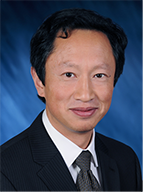ADC-and-DAC-based Transceivers for 100Gb Ethernet

Speaker: Jun Cao
Affiliation: Broadcom
Abstract: New Ethernet standards, such as 802.3bj, respond to the need for data rates over backplanes and copper cables to reach >100Gbps throughput. ADC-DAC-based transceivers enable advanced signal modulations and integrated DSP to combat channel impairments. Interleaved structure propels ADCs to higher speed while the mismatch calibration is the key to achieve better ENOB. Choice of sub-ADCs has a direct impact on the system performance such as power, latency and BER. While flash ADCs dominate 10GE applications, SAR ADCs are more widely used for 100GE. High-speed DAC is essential for modulation formats such as PAMx and provides precise multi-tap FIR for the transmitter. DACs at speeds higher than 10GSps are discussed and their application in PAM4 signaling is presented. Finally an ADC-DAC-based transceiver is demonstrated to enable 36Gbps serial transmission over legacy low bandwidth channels.
Biography: Jun Cao (S’96-M’99-SM’14) received the B.S. degree in physics from Peking University in 1994, MSEE from the University of Michigan in 1996 and the Ph.D. degree in electrical engineering from UC Irvine in 2003. In 1999, he joined NewPort Communications as one of the leading designers for the world’s first commercial 10G CMOS transceiver. Since 2000, he has been in Broadcom, currently as a Director and a distinguished engineer in analog design. He also serves in the wireline committee in CICC. He has published more than 30 journal/conference papers, with more than 20 in ISSCC/JSSC, on the topic of high speed transceivers and data converters. He also has more than 50 U.S. patents.
For more information contact Professor Behzad Razavi (razavi@ee.ucla.edu)
Date/Time:
Date(s) - Apr 04, 2016
1:00 pm - 2:00 pm
Location:
EE-IV Shannon Room #54-134
420 Westwood Plaza - 5th Flr., Los Angeles CA 90095
